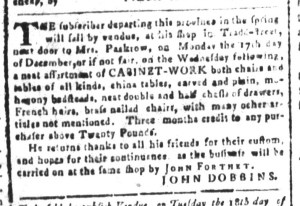What was advertised in a colonial American newspaper 250 years ago today?

“Will sell by vendue … a neat assortment of CABINET-WORK.”
John Dobbins, a cabinetmaker, operated a shop on Tradd Street in Charleston in 1770. As the year came to a close, he inserted an advertisement in the South-Carolina and American General Gazette to alert the public that he planned to leave the colony in the spring. In preparation for his departure, he planned a vendue or auction for December 17. His inventory consisted of “a neat assortment of CABINET-WORK,” including “chairs and tables of all kinds, china tables, carved and plain, mahogany bedsteads, neat double and half chests of drawers, French [c]hairs, brass nailed chairs,” and “many other articles not mentioned.” Dobbins sought to liquidate his wares. In effect, he ran a going-out-of-business sale. Prospective customers stood to acquire better bargains by buying at auction. The cabinetmaker faced improved prospects of finding purchasers for the array of furniture that remained in stock.
In his effort to attract bidders to the auction, Dobbins offered “Three months credit to any purchaser above Twenty Pounds.” Providing such flexibility likely increased the number of prospective customers who considered attending the vendue. After all, the cabinetmaker’s first goal was to get people through the door. The number and amount of sales depended on the crowd that gathered, so announcing that he extended credit – and set the threshold at twenty pounds – was a savvy tactic for encouraging attendance and participation at the auction.
Dobbins also took the opportunity to express his appreciation to his customers for their patronage during the time he made and sold furniture at his shop on Tradd Street. Although he was leaving the colony, the business would continue at the same location. Dobbins endorsed his successor, John Forthet, asking “his friends … for their continuance as the business will be carried on at the same shop.” As one last service to his customers, he offered a recommendation and a transition to another artisan who made and sold furniture. As part of maintaining good relationships during the time that he remained in the colony, he prepared for a smooth departure that included bargains at auction, credit for preferred customers, an expression of gratitude, and recommending a successor.
